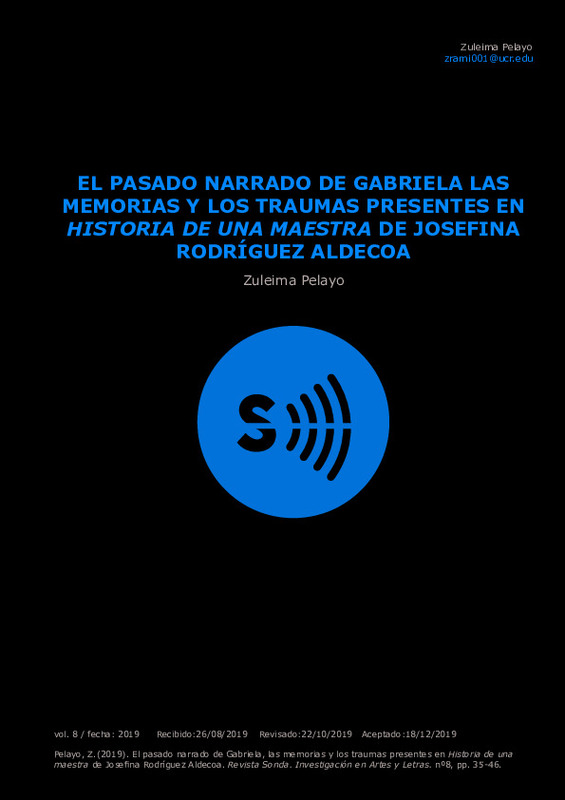Alborg, C. (1993). Cinco figuras en torno a la novela de posguerra: Galvarriato, Soriano, Formica, Boixadós, y Aldecoa, Madrid, Ediciones Libertarias.
Alcatraz Fornieles, J. (2002). "Historia y novela en los primeros tiempos de la transición", in Historia de la Transición en España, Madrid Editorial Biblioteca Nueva.
Aguado, T. (2010). Tiempos de ausencias y vacíos: Escrituras de memoria e identidad (1.ed.). Bilbao: Universidad de Deusto.
[+]
Alborg, C. (1993). Cinco figuras en torno a la novela de posguerra: Galvarriato, Soriano, Formica, Boixadós, y Aldecoa, Madrid, Ediciones Libertarias.
Alcatraz Fornieles, J. (2002). "Historia y novela en los primeros tiempos de la transición", in Historia de la Transición en España, Madrid Editorial Biblioteca Nueva.
Aguado, T. (2010). Tiempos de ausencias y vacíos: Escrituras de memoria e identidad (1.ed.). Bilbao: Universidad de Deusto.
Alphen, E. V. (1999). "Symptoms of Discursivity: Experience, Memory, and Trauma," in Mieke Bal, et al, eds., Acts of Memory: Cultural Recall in the Present (Hanover NH: University Press of New England).
Álvarez-Fernández, J. I. (2007). Memoria y trauma en los testimonios de la represión Franquista. Rubí (Barcelona: Anthropos Editorial.
Bertrad de Muñoz, M.(2016). "El << retorno >> en la novelística española desde 1939" Alicante : Biblioteca Virtual Miguel de Cervantes.
Cardús i Ros, S. (2000). "Politics and the Invention of Memory. For a Sociology of the Transition to Democracy in Spain". Disremembering the Dictatorship: The Politics of Memory in the Spanish Transition to Democracy. Ed. Joan Ramon Resina. Amsterdam-Atlanta: Rodopi.
Caruth, C. (1996). Unclaimed Experience: Trauma, Narrative, and History. Baltimore: Johns Hopkins University Press.
Caruth, C. (1995). Trauma: Explorations in Memory (Baltimore: Johns Hopkins University Press.
Caruth, C. (1991). "Unclaimed Experience: Trauma and the Possibility of History," Yale French Studies.
https://doi.org/10.2307/2930251
Castilla, A. (2011). Una mujer de letras y de la educación: última clase de literatura y pedagogía. El País. Web. https://elpais.com/diario/2011/03/17/cultura/1300316402_850215.html
Castilla, A. (2005). Conocer otros mundos te hace más razonable, El País. Web. https://elpais.com/diario/2005/10/09/cultura/1128808807_850215.html
Dupláa, C. (2000). Memoria sí, venganza no en Josefina R. Aldecoa: Ensayo sociohistórico de su narrativa. Barcelona: Icaria.
Dupláa, C. (1996). Identidad sexuada' y 'conciencia de clase' en los espacios de mujeres de La Tribuna. Letras Femeninas.
Fernández Prieto, C. (1997). Figuraciones de la memoria en la autobiografia. Claves de memoria, ed. José María Ruiz-Vargas, Madrid, Trotta.
Fraguas, A. (2004). Josefina Aldecoa destaca la memoria como 'madre' de la literatura. El país.
Herman, J. L. (1992). Trauma and Recovery. New York: Basic Book.
Herman, J. L. (1996). Crime ans Memory. Trauma and Self. Rds. Charles B. Strozier y Michael Flynn. Boston: Rowman & Littlefield Publishers.
Herzberger, D. (1995). Narrating the Past: Fiction and Historiography in Postwar Spain. Durham: Duke University Press.
https://doi.org/10.1515/9780822382416
Herzberger, D. (2008). A Life Worth Living: Narrating Self and Identity in Josefina Aldecoa's Trilogy. Foro Hispánico.
Hirsch, M. (1997). Family Frames: Photography, Narrative and Postmemory. Cambridge: Harvard University Press.
Kenny, N. (2012). Conclusion. The Novels of Josefina Aldecoa: Women, Society and Cultural Memory in Contemporary Spain, vol. 308, Boydell and Brewer.
Kietrys, Kyra A., and Linares, M. (2009). Women in the Spanish Novel Today: Essays on the Reflection of Self in the Works of Three Generations. Jefferson, N.C: McFarland.
Labanyi, J. (2007). Memory and Modernity in Democratic Spain: The Difficulty of Coming to Termos with the Spanish Civil War. Poetic Today.
https://doi.org/10.1215/03335372-2006-016
LaCapra, D. & Mazal Holocaust Collection. (1998). History and Memory after Auschitz. Ithaca, NY: Cornell Univerity Press.
https://doi.org/10.7591/9781501727450
LaCapra, D. & Mazal Holocaust Collection. (1999). "Trauma, absence, loss". Critical Inquiere.
https://doi.org/10.1086/448943
LaCapra, D. & Mazal Holocaust Collection. (2005). Escribir la Historia, escribir el Trauma. Buenos Aires Nueva Visión.
LaCapra, D. & Mazal Holocaust Collection. ( 2008). Representar el Holocausto. Historia, teoría y trauma. Buenos Aires.
LaCapra, D. & Mazal Holocaust Collection. (2001). Writing History, Writing Trauma. Baltimore: Johns Hopkins University Press.
Langer, L. L. (1991). Holocaust Testimonies: The Ruins of Memory. New Haven: Yale University Press.
Leggott, S. J. (1998). "History, Autobiography, Maternity: Josefina Aldecoa's 'Historia de una maestra' and 'Mujeres de negro."Letras Femeninas.
Leggott, S. J. (2004). Re-Membering Self and Nation: Memory and Life-Writing in Works by Josefina Aldecoa. Confluencia.
Nora, P. (1989). Between Memory and History: Les Lieux de mémoire. Trans. Marc Roudebush. Representations.
https://doi.org/10.2307/2928520
R. Rodríguez Aldecoa, J. (1990). Historia de una maestra. Barcelona: Editorial Anagrama.
R. Rodríguez Aldecoa, J. (1994). Mujeres de negro. Barcelona: Editorial Anagrama.
R. Rodríguez Aldecoa, J. (1997). La fuerza del destino. Barcelona: Editorial Anagrama.
R. Rodríguez Aldecoa, J. (1998). Confesiones de una abuela. Madrid: Temas de Hoy.
Rodriguez, P. S. (2011). La mirada laica. Wordpress. Ricoeur, P. (1985). Temps et récit, 3. Le temps raconte. Paris, Le Seuil, Traduccion de Georges Tyras y Juan Villa).
Sotomayor, C. T. (2009). Space and the Construction of the Self in the Narratives of Josefina Aldecoa. Women in the Spanish Novel Today: Essays On the Reflection of Self in the Works of Three Generations. Jefferson, N.C.: Jefferson, N.C. : McFarland.
Soliño, M. E. (1995). Tales of Paceful Warriors: Dolores Medio's». Diario de una maestro, y Josefina R. Aldecoa, Historia de una maestra, Letras Penisnulares.
Tyras G. y Vila J. (2012). Otro maldito ensayo sobre la recuperación de la memoria histórica. Madrid: Editorial Verbum.
[-]








